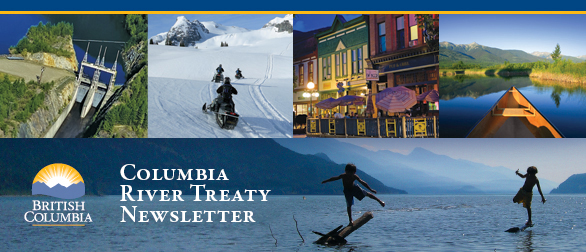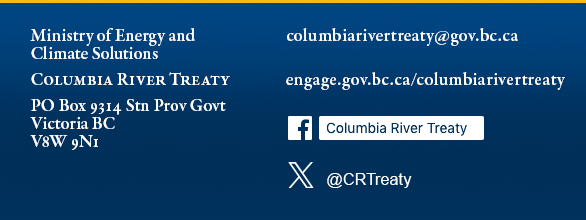Columbia River Treaty
Edition: December 2020

Aerial imagery data supports Ecosystem Function studies
Dec 23, 2020
For several years, Columbia Basin Indigenous Nations have been leading efforts to explore how to enhance Columbia Basin ecosystems. This work is actively informing the Canadian negotiating team’s options for how to address ecosystems in a modernized Columbia River Treaty. During presentations at the Province’s 2019 community meetings, Basin residents raised concerns that there may be gaps in the scientific data needed to support these efforts, and asked what steps are being taken to obtain some of the missing information.
The Province of B.C. has since used aerial imagery of Arrow and Kinbasket reservoirs, supplied by BC Hydro, to develop geospatial mapping products of both reservoirs. Geospatial mapping is different from traditional mapping because it uses digital data to generate a custom map for a particular purpose.
The aerial imagery was used to create digital elevation models, which are computer generated 3D representations of the terrain along each reservoir. The models were finalized in May 2020 and have been shared with the Indigenous Nations-led Ecosystem Function sub-committee to support its research.
"Having accurate, detailed mapping of the Arrow and Kinbasket drawdown zones is a great help to the studies we are doing to support integrating ecosystem function and understanding cultural value impacts from the Columbia River Treaty,” said Mark Thomas of the Shuswap Indian Band and a member of the group directing the ecosystem function studies. “For example, this information allows us to more closely assess the potential to re-establish vegetation along the upper elevations of the reservoir, which would accomplish multiple objectives, such as thermal protection for the water, wildlife habitat, protecting sites from bank erosion and protection against eroding archaeological sites.”
The geospatial mapping products will be available through Selkirk College’s Columbia River Treaty portal; a resource the College is developing as part of their Rural Open Data project. Look for an update in a future edition of this newsletter, and check the Columbia River Treaty Facebook and Twitter to learn when the portal is accessible to the public.


